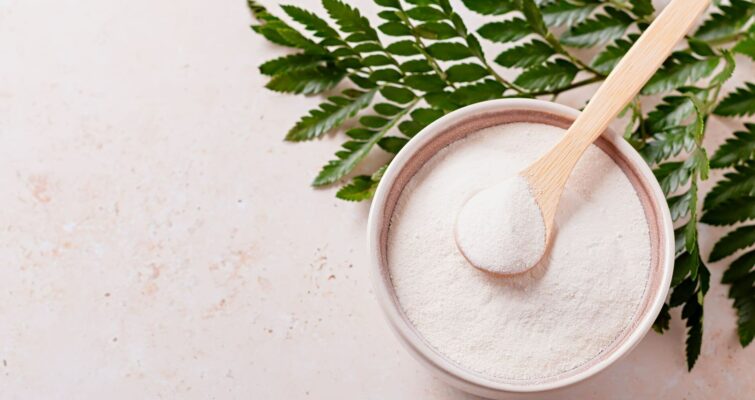Inositol might not be a household name, but if you struggle with any kind of hormonal balance symptom, it’s a potential solution you’ll want to explore. As you’ll learn in the next paragraphs, its benefits extend from mental health all the way to hormones, helping to support overall balance within your body. So what exactly is inositol, and why should you care about it? Let’s dive in.
What is Inositol?

Inositol, sometimes referred to as Vitamin B8, is a type of sugar found naturally within your body, and also in certain foods and supplements. It influences insulin response and numerous hormones associated with mood and cognition (1).
It’s an essential component of cell membranes, playing a critical role in cell signaling and communication. Inositol also acts as a precursor for several key molecules, such as phospholipids, that are vital for the proper functioning of your body.
Basically, it helps hormones, cellular signals, and other messengers do their job more efficiently, which means it influences many different tissues and organs in your body.
Related: Best Supplements for PCOS
Forms of Inositol
There are actually 9 different isomers of inositol, but for the purpose of hormones and overall health, there’s just two that are the most bioavailable:
- Myo-inositol, which is the most common form, and is crucial in cellular signaling and insulin regulation.
- D-chiro-inositol, which plays a significant role in producing secondary messengers that facilitate insulin action.
Both forms are essential for maintaining various bodily functions and offer unique benefits when combined.
What Inositol Does in The Body
Inositol helps regulate various hormones, support mental health, and promote fertility. It’s also necessary for the proper functioning of cell membranes and has antioxidant properties, helping to protect against cellular damage (2). It’s main benefits involve:
- Hormonal health, regulating hormones like insulin, and playing a role in supporting estrogen & testosterone. Inositol is often used to improve PCOS symptoms naturally.
- Fertility for men & women by way of supporting ovulation, egg quality, and sperm quality.
- Mood & mental health because of its influence on serotonin and dopamine, two neurotransmitters critical for mood regulation.
Read: The Link Between Hormones & Insulin Resistance
The Impact of Inositol on Hormonal Health
Inositol has been shown to have a significant impact on hormonal health, particularly in regulating insulin and blood sugar levels. This can be beneficial for those with conditions like PCOS or diabetes.
Inositol has also been linked to estrogen and testosterone production, making it a crucial nutrient for reproductive health (3). Inositol supports overall hormonal health by ensuring efficient cellular communication and enhancing insulin sensitivity.
Women experiencing symptoms of hormonal imbalances, such as mood swings or fatigue, may benefit from adding Inositol to their regimen.
Inositol and Women’s Health
Inositol has garnered attention for its positive impact on women’s health, particularly for those experiencing hormonal imbalances.
PCOS Management
For women with PCOS, Inositol is a game-changer. By improving insulin sensitivity and balancing hormones, it helps reduce common symptoms like irregular periods, weight gain, and acne. Many women report significant improvements in their quality of life after incorporating inositol into their routine.
Related: Birth Control Isn’t the Only Way to Manage PCOS
Menstrual Irregularities

Whether it’s a missing period, irregular cycles, or painful period, inositol may be able to help by stabilizing levels of hormones that regulate a healthy cycle. Myo-inositol plays a crucial role in FSH signaling, whose primary function is to help regulate the menstrual cycle.
Clear Skin
Acne that’s caused by hormonal imbalances can be challenging to treat, but inositol can help. Inositol reduces androgen excess, which is responsible for much of the oil production which is the root cause for a great number of breakouts (4).
Watch: Get RID of Hormonal Acne (once and for all!)
Fertility & Ovulation
Up to 80% of women with PCOS struggle with anovulatory fertility, which occurs when the ovaries fail to release an egg each month (5). Myo-inositol appears to normalize FSH signaling, enhance oocyte (immature egg) quality, and reestablish proper ovarian functioning (6).
Although inositol is not a cure for infertility, it may improve PCOS symptoms in many ways, increasing your chances of getting pregnant.
Inositol for Men
Though often highlighted for its benefits in women’s health, inositol also offers advantages for men, particularly concerning mental wellness and fertility.
Mental Wellness
Inositol’s impact on neurotransmitters makes it beneficial for men dealing with anxiety, depression, or stress. By supporting serotonin and dopamine function, inositol helps improve mood and cognitive function, offering a natural approach to mental health management.
Reproductive Health
While less studied in men, some evidence suggests that inositol may improve sperm quality and motility, enhancing reproductive health (7). Men looking to boost their fertility may consider inositol as part of a comprehensive approach to reproductive wellness.
Inositol and Mental Health

Inositol might be a valuable ally in managing mental health conditions because of its ability to support neurotransmitter signaling. Neurotransmitters are the chemical messengers inside your brain, regulating everything from sleep and appetite, to energy and mood.
Low levels of inositol have been linked with depression and anxiety disorders (8).
Anxiety Management
Inositol helps alleviate anxiety by improving serotonin function. In one study, inositol worked as well as fluvoxamine to reduce the frequency and severity of panic attacks, and without side effects (9).
Depression Relief
In a double-blind, placebo-controlled trial, inositol was found to have a “significant antidepressant effect” when given to depressed patients for 4 weeks (10). Inositol can help lift mood and reduce depressive symptoms, offering a natural adjunct to traditional treatments.
Obsessive-Compulsive Disorder
Only about 65% of individuals respond to conventional treatment for OCD, and for those who do not, inositol may offer a novel solution (11). By modulating neurotransmitter pathways, it helps reduce compulsive behaviors and intrusive thoughts, providing relief for those struggling with this challenging condition (12).
Sources of Inositol
Our bodies produce inositol naturally, but it can also be found in various foods such as fruits, grains, and beans. The most concentrated sources of inositol include:
- Citrus fruits like oranges, grapefruits, and lemons
- Cantaloupe
- Nuts and seeds like peanuts & sunflower seeds
- Beans such as chickpeas, kidney beans
Though these foods are inexpensive and accessible to many, food sources may not provide adequate amounts of inositol to fully reap its benefits.
Effectiveness of Supplements
While getting Inositol from foods is beneficial, supplements offer a more concentrated dose, which can be particularly useful for those dealing with specific health conditions like PCOS.
Inositol supplements often come in powder or capsule form, providing an easy and effective way to incorporate this nutrient into your diet.
Hormone Helper, my signature hormone-healthy blend, contains 1,500 mg of inositol along with other natural ingredients to support hormone balance and overall wellness.
Incorporating Inositol into Your Routine
Adding Inositol to your diet or supplement regimen is straightforward and can offer significant health benefits. Consult with your healthcare provider to determine the right dosage for you, as it may vary depending on your individual needs and health conditions.
Dosage
Inositol supplements typically range from 500 mg to 2,000 mg per day. It is always best to start with a lower dose and gradually increase if needed.
Both myo-inositol and d-chiro-inositol appear to be effective natural treatments for PCOS symptoms, but research suggests that the ideal is a combination in a ratio of 40:1 MI to DCI (13). For example, that would be about 2000–4000 mg of myo-inositol and 50–100 mg of D-chiro-inositol a day.
Combining with Other Supplements
Inositol can be taken alongside other supplements such as B vitamins, magnesium, and omega-3 fatty acids for greater benefits. It is always best to consult with a qualified holistic healthcare provider before combining supplements to ensure safety and effectiveness.
What to Remember
Inositol offers a wide range of health benefits, from improving mental health to supporting reproductive function. Whether through diet or supplementation, incorporating this nutrient into your routine can have positive effects on your overall well-being. Be sure to listen to your body’s response as you incorporate inositol into your daily routine.


